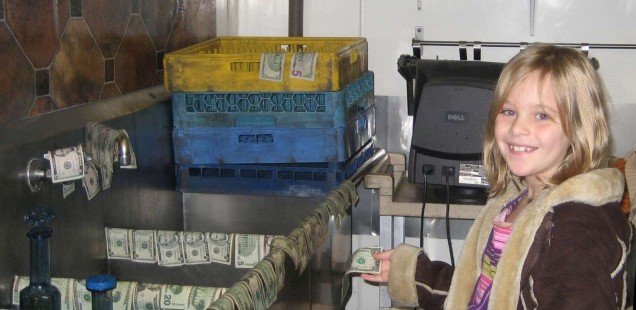
10 Reasons not to open a restaurant in Costa Rica (or anywhere else)
Aside from some of the general queries about Costa Rica, the question that I got asked the most after informing friends and colleagues that we were going to spend time here was whether I was going to open a restaurant in Costa Rica. That would be like retiring from a life as a stuntman because it was too dangerous in order to pursue a career as a bomb technician. Not only do I not plan on opening a restaurant in Costa Rica, I don’t plan on opening one anywhere in the world.
I view myself as a realist. Heather views me more as a cynic. Regardless of the label, before I opened Abay and Alma, I had an extremely accurate understanding of what I would be facing. Despite the fact that there are over 600,000 restaurants in the U.S., reliable statistics on the success of those restaurants are difficult to come by. We’ve all heard figures like “90% of restaurants fail in the first year”. Studies have shown that this number is exaggerated. Whether the failure rate is 90% or closer to 60%, the challenge lies not in simply keeping the doors open, but rather in the complexity of the daily operations even if you are a “success”. It takes a unique person to operate a successful restaurant. It takes an even more unique person to operate a successful restaurant and be happy doing so. These folks deserve praise for their tireless efforts.
This top 10 list isn’t just the ramblings of a whining, former restaurant owner who barely survived. I was in this business for nearly a decade. I am proud of the fact that my first restaurant, Abay, became a neighborhood favorite and was one of the catalysts for the development that eventually took place in that neighborhood. By all accounts, Abay and Alma were “successful”. But how should “success” in terms of a restaurant be defined?
What follows is a compilation of insights based on my experiences and the experiences of friends who are restaurant owners, chefs, and managers. In my personal opinion, an excellent candidate to own a restaurant is someone who has too much money, is tired of spending time with their family, is sick of seeing their friends, despises going on vacation, doesn’t need a lot of sleep, and is in good physical condition.
One owner’s life can vary from another’s based on factors like the restaurant size, concept, hours, or location. To be sure, there are owners who don’t face all of the challenges I will outline below. Thus, feel free to dispute and/or ignore everything I am about to write. If you are considering taking the plunge, however, it probably makes sense to consider the factors herein. If, after reading this, you still insist upon opening a restaurant, your next step should be making an appointment with a psychiatrist. If that psychiatrist confirms that you are in fact crazy, then good. You might be restaurant-material.
1. The Restaurant is a Diabolical Creature Hell-Bent on Destroying Your Happiness
We have all heard that restaurants demand long hours. But what, exactly, does this mean? It often means working 7 days a week non-stop. Even if your restaurant is closed one day per week, there is a good chance you will use that time to catch up on paperwork or to perform repairs. Moreover, because your busiest period (weekends and certain holidays) is the rest of the world’s leisure time, your schedule is at odds with that of everyone else’s. Thus, aside from the incredible physical and mental toll constantly being at your restaurant takes, it also tremendously impacts the life you try to have outside of the restaurant. Before I opened restaurants, I would regularly meet friends for lunch, attend the occasional happy hour, and go to dinner with my wife. Once they were open, I never did activities like this. When I say “never”, I don’t mean infrequently. I literally mean I did them an average of zero times per year.
Most importantly, the long and odd hours impact your family life. Is it hyperbolic and somewhat paranoid to think that the restaurant is out to get you? Maybe. But it seemed to know when I was away attempting to lead a normal existence even for a short period of time. Heather used to joke that “she” (meaning Abay) would get jealous of any time spent with my wife. In fact, I remember much of my pivotal life events over the past 10 years by where I was when I got the call that something was wrong at one of the restaurants. Honeymoon – the 3 door freezer decided to stop working. Child’s Birthday Party – the sous chef went MIA. Family Vacation – a different Sous Chef went MIA and a front of house employee had a relapse. Wedding Anniversary – the draft beer system stopped working in the middle of a Saturday night. Weekend Getaway – the HVAC stopped working. Birth of Child – the hot water tank burst and drenched the whole office.
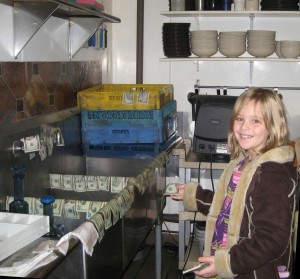
The hot water tank was located on top of the office. When it cracked, it rained down water on items like the computer and cash drawer. Here is Maddie giving a new meaning to “money laundering”.
The above events exclude the more regular equipment malfunctions that might happen while you’re there, like the oven not heating (or catching on fire and literally shooting flames at the chef’s groin), the dish machine going down, the heat lamps shorting out, a cooler not keeping temp, a belt snapping on the kitchen exhaust fan, alarm systems tripping repeatedly in the middle of the night, the POS system malfunctioning, and sinks/toilets getting backed-up. Because there is so much equipment constantly operating in an intense environment, even if you do a good job of cleaning and maintaining it, something is going to break. Throw in power outages, water outages, and the admittedly rare (but still occurring) set of frozen pipes, and it’s enough to make an otherwise sane person snap. And I wasn’t sane to begin with or I wouldn’t have opened a restaurant in the first place (see paragraph 5 above).
2. Net Profit Margins are Low and Required Effort is High
Restaurants average a net profit margin of somewhere between 1.8% and 6.0%, depending on the type. What that means is that if you spend $30.00 dollars at a restaurant, that restaurant keeps between $0.54 and $1.80. To be sure, there are industries that have even lower margins. But I don’t know of many businesses which take as much effort to generate their products and services while retaining such a low return on investment. In a restaurant, every person at every moment needs to be productive. If they are not, your labor costs will be too high. This perspective has jaded my view of a work environment. If I go just about anywhere other than a restaurant, I look around, see that people aren’t scrambling like crazy, decide the business is overstaffed, and want to tell the manager to send half of the workers home.
Because of those narrow margins, for a restaurant to hit its numbers, it has to be busy. A busy restaurant means everyone is working at their maximum capacity. When a server can’t take another table, when a bartender barely can keep up with the drink tickets coming in, and when a kitchen staff doesn’t even have time to step away from the line to go to the bathroom, that’s when things are “good”. If a restaurant is always calm, the employees’ hearts aren’t regularly racing from adrenaline, and they never feel short-staffed even during a crunch, then that restaurant probably isn’t hitting its numbers. That doesn’t necessarily mean it will close. It just means it’s likely losing money.
Because of this taxing environment, people get burned out. This burnout means that staff turnover can sometimes be high. A positive corporate culture and proper management can limit turnover. But most restaurants are bound to have it to some extent. With the rise of the Food Network, reality shows, and the concept of a celebrity chef, restaurant employment is accepted as a viable career even more now than it used to be. Still, restaurants employ a large amount of part-time workers, many of whom have no desire to make it a full-time job. They might be students who are in school to earn a degree for their “real” job and just working in a restaurant to make ends meet. Weariness coupled with seasonal, part-time employees leads to high turnover rates. From an ownership standpoint, turnover is a killer. Not only is training expensive, but it’s difficult to uphold consistent standards if your staff is always new.
3. Your Inventory Can Disappear Due to Spoilage or Theft
Just like the requirement of every person in the place having to work hard every minute of every shift, the same vigilance has to be applied to food costs and inventory management. Especially if you are a restaurant serving fresh food like mine did, much of your inventory is perishable. This means your ordering and prepping has to be executed down to a science. If you get it wrong, you either run out of the dish and disappoint guests or sit on too much product and it goes bad.
Employee theft at Abay was almost nonexistent and it wasn’t that common at Alma either, especially considering we had a bar. But I’d be lying if I said it never happened. The best that you can do is hire good people, have a culture in place that deters it, and track all of your inventory in as detailed a manner as possible. For the record, theft isn’t just someone walking out of the back door with a steak or a bartender drinking up the inventory, it’s employees giving away excessive amounts of food and drinks at a discounted rate (or for free) to friends and family. It’s difficult to manage, but the best way to do so is to have clear policies in place outlining what is acceptable and what is not. Even then, those policies can be disregarded or abused without keen oversight.
4. You Have Limited Time to Deliberate about Key Decisions
The pace at which you have to make critical decisions that impact your business is unlike anything I’ve ever seen. Through various board memberships and from retaining my law license, I ended up straddling the corporate world and the restaurant world for the past ten years. One of the elements of the restaurants which stands out most in my mind is how I would have to make decisions on the spot which, in a corporate setting, would have required the formation of multiple committees, with meetings taking place over several months to discuss the subject matter. With a restaurant, you just don’t have the luxury of time. Significant issues arise, you must take quick and decisive action, and then you hope for the best.
Chefs have similar constraints. I view a good chef as part entrepreneur, artist, and drill sergeant. Seeing them turn a delivery of fresh fish which arrived at 2:00 pm into an amazing special of the day by 4:00 pm is something to behold. In just a couple of hours, they would convert raw materials into a beautiful and delicious dish, a picture of which would be appearing on a guest’s Facebook, Instagram, Yelp, or Urbanspoon account later that night. Not only effort and talent, but a lot of calculating would be involved in that process. If we priced it too high, it wouldn’t sell. If we priced it too low, we’d lose money on it. They had to balance a variety of factors in a short timeframe and be 100% right each time.
5. Social Media Sucks up Your Time and Sometimes Irritates You
No one who is the owner or chef of a current restaurant can complain about social media without the fear of unyielding backlash. So I can do it for them here.
With the review sites like Yelp, Urbanspoon, or TripAdvisor, it’s frustrating that people don’t feel comfortable saying to your staff in person the types of criticisms they will level behind a keyboard. Because it’s common for restaurant owners to set up their accounts so that they are notified when a new review is posted, you can know instantly what positive or negative comment is being said about your business. If you’re the kind of person that gets bothered by reading something negative about a business into which you’ve literally put all of your money, blood, sweat, and tears, then your day might be ruined when a bad review pops up. If we would receive one, I would begin the investigation by first reaching out to the reviewer. Next, I would talk to the staff, review the day’s tickets, and then determine who waited on them, what they ordered, what went wrong, and how we can avoid it in the future. Not only does all of this take time, it can become mentally and emotionally exhausting. Moreover, in a weird way, you are allowing a complete stranger who may have simply been in a bad mood when he or she dined at your establishment to hold much more power over your happiness than they deserve.
As for sites like Facebook, Instagram, and Twitter, those interactions typically are overwhelmingly positive, but there are a lot of interactions to be had. Supporters expect you to respond to their comments and tweets and consistently participate in a dialogue. They are a wonderful tool and can be fun, but do you really want the few precious minutes you have with your family each day to be taken up with you monitoring your business pages on those sites? If not, are you maintaining the proper engagement levels to make your guests happy? If you decide you don’t have the time or energy, are you going to hire someone to do it for you? If so, can you afford to compensate them?
6. Paying People a Living Wage is Harder Than It Should Be
The restaurant industry has 6 of the 10 lowest paying jobs in the U.S. I agree whole-heartedly with people who argue stridently that everyone who works full-time should be able to eat well and pay their bills based on the income from their job. It’s not saying much, but our non-tipped employees always started out at a pay rate higher than the PA minimum wage and higher than the Pittsburgh living wage for one person as calculated by MIT. Regardless, each time I did payroll for either restaurant, I always felt like just about everyone on the staff deserved to make more money than they did. I couldn’t figure out a way to make that happen, but some restaurants have, and pay all of their employees a living wage and offer benefits as well. In fact, there is a bit of a movement to seek out and support restaurants that do this. I applaud those restaurants that have figured out a magic formula. For many restaurants, however, paying their employees more than they currently do would require them to raise prices. I know that sounds like an overly-simplistic, ultra-conservative, pro-business statement. But my position isn’t political, it’s just math.
Moreover, before I owned restaurants, I was unknowingly part of the problem. We were huge supporters of funky, independent restaurants, many of which served food from another country. Not only were the dishes often healthy and delicious, but they were inexpensive for the quality that we were receiving. After owning restaurants and getting to know some of these folks, what I came to learn is many of them had family members working at the restaurant for little or no money.
In terms of pricing, it seems there’s been a race to the bottom when, in fact, it should have gone in the other direction. I don’t believe current pricing, especially at some of our favorite Mom and Pop places, accurately reflects their true operational costs. These owners sacrifice profit by keeping prices low to get guests in the door. The result is the staff not making the money that they should be making.
7. Throwing Great Parties or Being a Good Cook Does Not Mean You Should Open a Restaurant
Since many of my current friends are from my pre-restaurant owning days, when I would find the rare time to get together with them, they would want to know about my life. Well-paid, but often unhappy in their corporate jobs, they would ask specifics about what it was like to own a restaurant. After telling them I was required to learn skills like repairing a toilet, sink, roof, oven, and faulty wiring, they wouldn’t be phased. Moreover, after explaining to them that I worked double the hours, made 5 times less in salary, and no longer had a 401(k) plan, they still would wonder how bad it really was. I finally began to tell them two analogies which seemed to resonate, depending on their background.
The first is that running a restaurant is like having a wedding reception every day, but harder. At least with a wedding reception, you planned it for a long time, you had a sense of who was attending, and you knew what they were ordering. With a restaurant, you’re cramming the effort that went into that reception into a day or two and still pulling it off without a hitch. The other way to think of operating a restaurant is that it’s like running successive marathons without a break. I’ve run two marathons in my life. Having to run 26.2 miles the next day after finishing the first marathon would have been awful. Restaurant life feels sort of like that. You’re proud, exhausted, elated, and gratified to have survived the marathon. Then you have to do it all over again the next day. And the next day after that.
In any event, if you’re an illustrious home cook, just cook for your friends and loving family and let them lavish praise onto you. If you host awesome parties, keep doing that. Don’t tarnish your excellent cooking skills or amazing party throwing abilities by opening a restaurant.
8. You Are Going to Run Around More Than You Ever Have in Your Life
There are different avenues for getting items into your restaurant which you will convert into the products you sell. The complexity of that process depends somewhat on your specific concept. Acquiring certain spices for Abay was always a nightmare since they were being sent from Ethiopia. If you think about your restaurant in terms of categories, you might need to regularly receive meat, fish, produce, dairy, bread, frozen items, spices, dry goods, canned goods, cleaning products, and disposables. You could do all of that shopping yourself, have a particular purveyor for each category deliver items to you, have a broadliner supply you with all of those items, or establish a system which combines all three options. If you offer alcohol, then add beer deliveries and liquor store pick-ups to the mix.
Regardless of which path you choose, it all requires an enormous amount of coordinating and running around. Despite your best efforts at implementing a foolproof system, the likelihood remains that, as the dinner shift begins, someone realizes that one critical item fell through the cracks. You’re then left with the choice of 86ing the dish that requires that ingredient or going to a grocery store to purchase it at an exponentially higher price than you would have gotten it from your purveyor.
9. If You Have a Strong Desire for Order, Open Another Type of Business
Ask yourself this one question and be honest in answering. Would you mind it if my friends and I came to your house each day, rearranged all of your furniture, opened every single cabinet in your kitchen, used all of your dishes and utensils, definitely broke something, but then put it all back together to the best of our ability each night? If the thought of that doesn’t cause you anxiety, then you might consider opening a restaurant. If you’re someone like me, who color codes closets, irons jeans, and puts bills in my wallet based on lowest denomination to highest with the fronts all facing forward, then the mere thought of the aforementioned bedlam might cause you to have a nervous tic.
10. You Probably Aren’t Going to be Happy and You Won’t Even Realize It
Let’s say you beat the odds, your restaurant is profitable, and it consistently has phenomenal reviews. I would argue that if you truly look at it, you still might only have a Pyrrhic victory on your hands. If I hadn’t felt that way, I wouldn’t be in Costa Rica right now.
Based on sources like the Happy Planet Index and the Travel Channel, Costa Rica is one of the happiest places on the planet. Of course this is somewhat subjective and can be disputed, but there is no doubt that people here consciously think about happiness. It is in their “pura vida” mantra. Yet, of the dozen or so restaurant owners we’ve gotten to know since we’ve been coming here, one fact stands out. They are stressed out and work a lot! Don’t get me wrong, they do a better job of trying to set aside time to enjoy outdoor activities and to spend time with friends and family than their U.S. counterparts. But we still have talked to owners who live or own a restaurant a block from the beach and they tell us they haven’t seen it in months because they are always working. Regardless of whether they’re hitting their numbers and regardless of whether their reviews are spectacular, that is not happiness. They know it and they want to change it.
The upshot is this. If you can handle all I’ve outlined above, plus deal with the litany of items I haven’t mentioned such as constant requests from non-profits for complimentary food or gift certificates, chefs with sizeable egos, the inevitable HR issues, and the deterioration of your physical (and mental) health and stay happy all the while, then take a shot. I had 1,000 more fun experiences in the restaurants than any one experience in the corporate world. Nothing beats the adrenaline rush and general feeling of accomplishment that happens when the staff all pulls together to make a busy night flow flawlessly. In fact, just thinking of those times makes me want to open another restaurant. I guess that desire to relapse means I’ll always be a recovering restaurateur, even here in paradise.

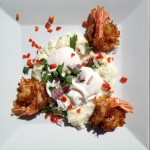
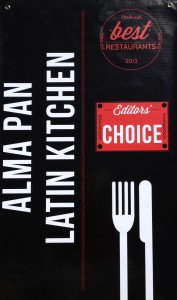
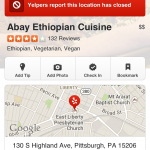

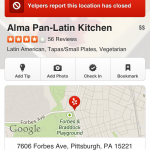
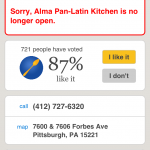
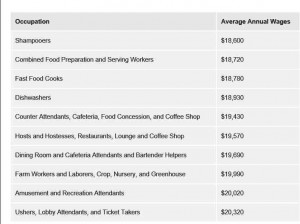

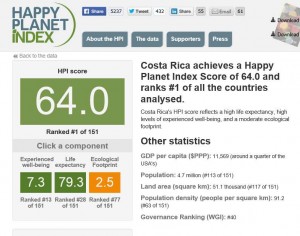





Realistic and cynic aren’t synonyms? Huh. And all this time, I thought….
Hmm. Maybe there really isn’t a distinction.
How well I remember.
You should. You were instrumental in keeping Abay running.
Does this mean you’ll be coming back to Alcoa?
Hey Betsy. It’s nice to hear from you. Returning to Alcoa would really be coming full circle!
This applies to people who don’t know what the F they are doing. This article is funny! We got this! Check us out…Lola’s Bistro in Key West
Costa Rica here we come!
We’ll definitely have to check out Lola’s Bistro the next time we’re in Key West.